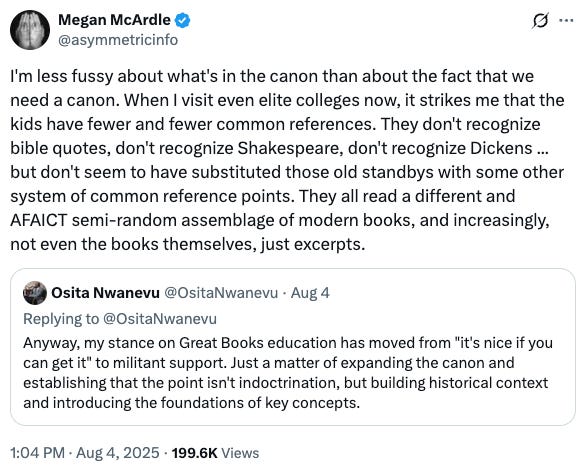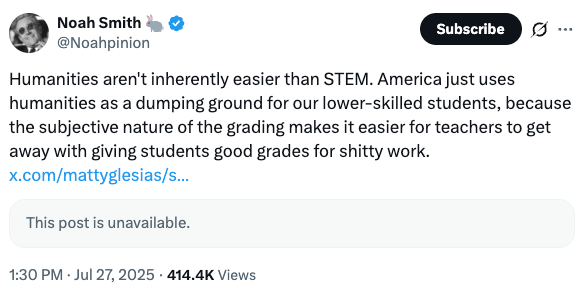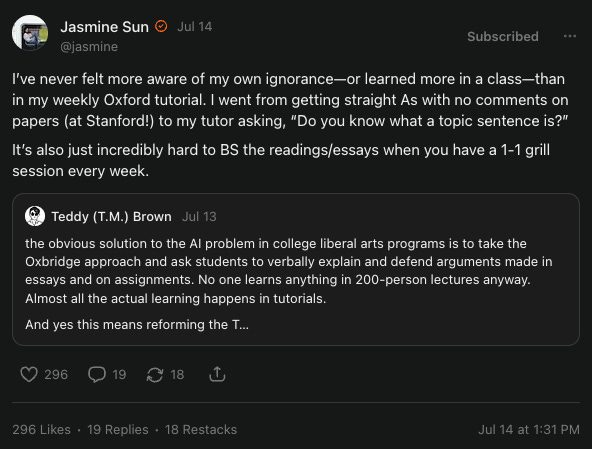The Decline and Fall of the Humanities?
There are two conversations happening right now: one about the value and nature of the humanities, and one about what AI and phones are doing to people’s minds. They are related.
There are two conversations happening right now: one about the value and nature of the humanities (often used as an interchangeable term for “liberal arts,” which shows part of the problem right there—people can’t tell the concepts apart), and one about what AI and phones are doing to people’s minds. These conversations are related, and they intersect, but they haven’t yet been integrated. This post will not attempt that integration (although the next one will), I’m just noting some evidence of the back and forth within the past two months.
We’ve long had conversations about the value and nature of humanities, and the impact of technology on people’s ability to learn (particularly at college). The Closing of the American Mind by Allan Bloom (published 1987) tackled both of these things directly, as have many people before him. He said this about music:
The music of the [modern day], on the other hand, knows neither class nor nation. It is available twenty-four hours a day, everywhere. There is the stereo in the home, in the car; there are concerts; there are music videos, with special channels exclusively devoted to them, on the air nonstop; there are the Walkmans so that no place—not public transportation, not the library—prevents students from communing with the Muse, even while studying. (pp.68-69, 25th Anniversary paperback edition)
And in 1994, the television show Touched by an Angel opened an episode with two angels looking over a high school in the morning, reflecting on how technology had become all encompassing and inescapable (watch the first 90 seconds of the video—I also recommend the show in general). Their estimate of the situation was that it was crowding out some of the good of humanity, and that was even before widespread use of the internet.
But history does not repeat, it rhymes. Our current conversation is happening as AI rises, as colleges face dropping enrollment (and many are closing), as phone use comes under more scrutiny, and more. We can learn from the past, but our solutions will need to be tailored to both human nature and our contemporary context. I, of course, an an optimist. I don’t necessarily endorse anything in the sources below, I’m just holding them up as parts of a conversation. There are many more beyond these.
Leave comments with any articles or social media posts you think would be good to add to the list below.
What are phones doing to people’s minds? What is AI doing to minds and schools?
“what i learned not looking at screens for 3 weeks,” Twitter/X thread, Fred @FriedKielbasa (August 17, 2025).
“Quitting Your Phone is Actually Simple: but not necessarily easy,” This is Human, Ray Katharine Cohen (August 10, 2025).
“In my zombie era: The third stage of culture in the age of infinite information,” Numb at the Lodge, Sam Kriss (July 2, 2025).
“Can You Read? For many people, the answer is ‘no’ more often than they think. A note on Flowers for Algernon,” The Algernon Project, Daniel Golliher (July 11, 2025).
“Tyler Cowen on how AI will reorder economies, schools, and spirituality,” the “The education system’s failure to adapt” section at 27:11. Azeem Azhar’s YouTube channel (June 4, 2025).
“I’m a teacher — AI is beating us in the fight for kids’ minds,” The New York Post, Jeremy Adams (June 20, 2025).
What about the humanities?
Some articles
“The humanities should be harder: Low standards have devalued non-STEM study,” Slow Boring , Matt Yglesias (August 7, 2025).
“Unyoke the Sciences From the Humanities: Arts and sciences typically cohabitate. Should they?” The Dispatch, Evan D. Morris (August 7, 2025).
Some social media posts
Tanner Greer of The Scholar's Stage had a long thread about how to make an English major rigorous. I have quoted the first tweet in the thread at full length below (from July 5, 2025):
I was pondering the other day what would be required to make an English major as rigorous as possible (i.e. comparable to a hard science degree).
A few tentative thoughts.
1. The major in English should be first and foremost a major in English philology. Every student takes the basic linguistics core courses (phonology, semantics, morphology, syntax). A semester survey on English grammar caps that section off.
Every student takes 2 courses on old english, 1 on middle English, 1 one Early modern English, and then something on modern English varieties or modern English socio-linguistics.
You probably also want to include 3 years of Latin or French, or a passing test grade in either.
This is probably sufficient to give the student foundational knowledge in English *as a language.*
2. You would want a core set of courses that require technical mastery in interpreting texts. This means a poetry class that requires you to memorize poetic forms and scan hundreds of poems. It means memorizing and reciting poetry and other passages for credit. It means a prose class where people are taking big blocks of Faulkner or Conrad and diagramming the sentences and passages. It means diagramming famous essays and the structures of novels.
I am not sure how many courses this would require, but maybe two, one focused on prosody in poetry, the other on structure in prose.
3. Something like the following progression of foundational surveys:
a) Classical antecedents: Iliad, Odyssey, Aeneid, Metamorphosis. Even better if the class also assigns poems or short stories that allude to this material so that students can see the connections over time.
b) King James Bible. (Same thing as before--but perhaps even more critical to include the poems/short stories). Make students memorize key Bible passages.
c) Shakespeare survey. At least 8 plays across genres. Make students memorize key passages.
d) English poetry to Milton + Paradise Lost. Make students memorize.
e) English poetry after Milton survey. Make students memorize.
f) 18th and 19th century novels (assign 12, unless you have a really big novel like Moby Dick, in which case you can shorten a bit; at least half of the novels should have been written in English).
g) Development of the essay to 1900 (Start with Montaigne and Bacon and move forward in time. Include several book length works)
g) The modern essay and narrative nonfiction (include several book length works--Didion, Wolf, McPherson, that sort of thing).
There also should be at least one research based class, but I suppose they can choose can between different topics/authors there.
4. I would have previously said a series of courses on composition but given ChatGPT and the inevitability of cheating I do not really know if there is a point to this anymore. The curriculum would need to be focused on things that can be tested, things that can be recited, and class discussions and debates. Students will have to learn how to write well through reading good models.
Unfortunately, the inability to assign essays makes it difficult to reach out rigor goal but I do not have any good solutions his.




